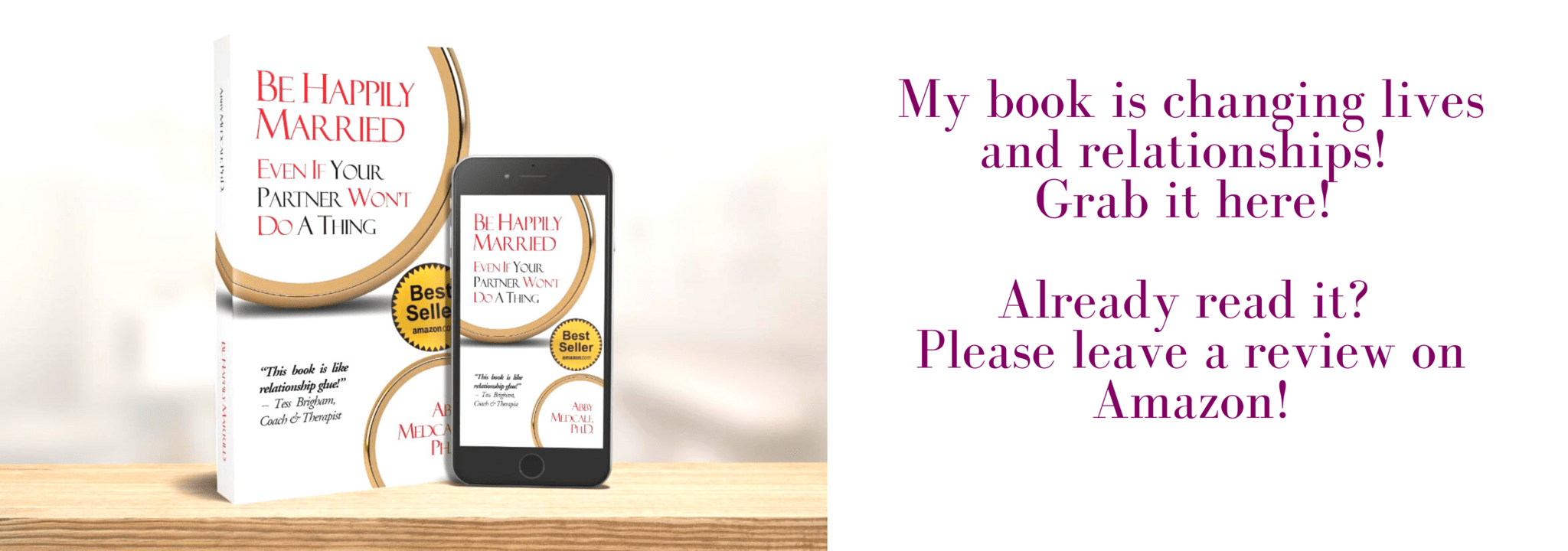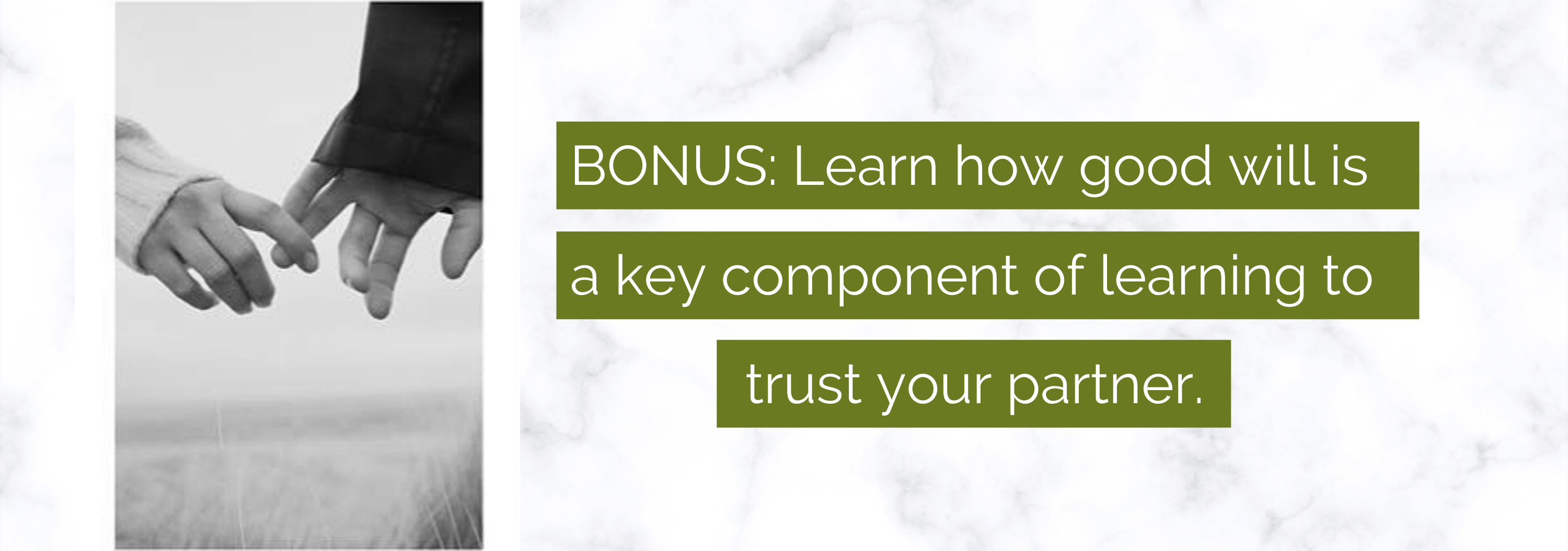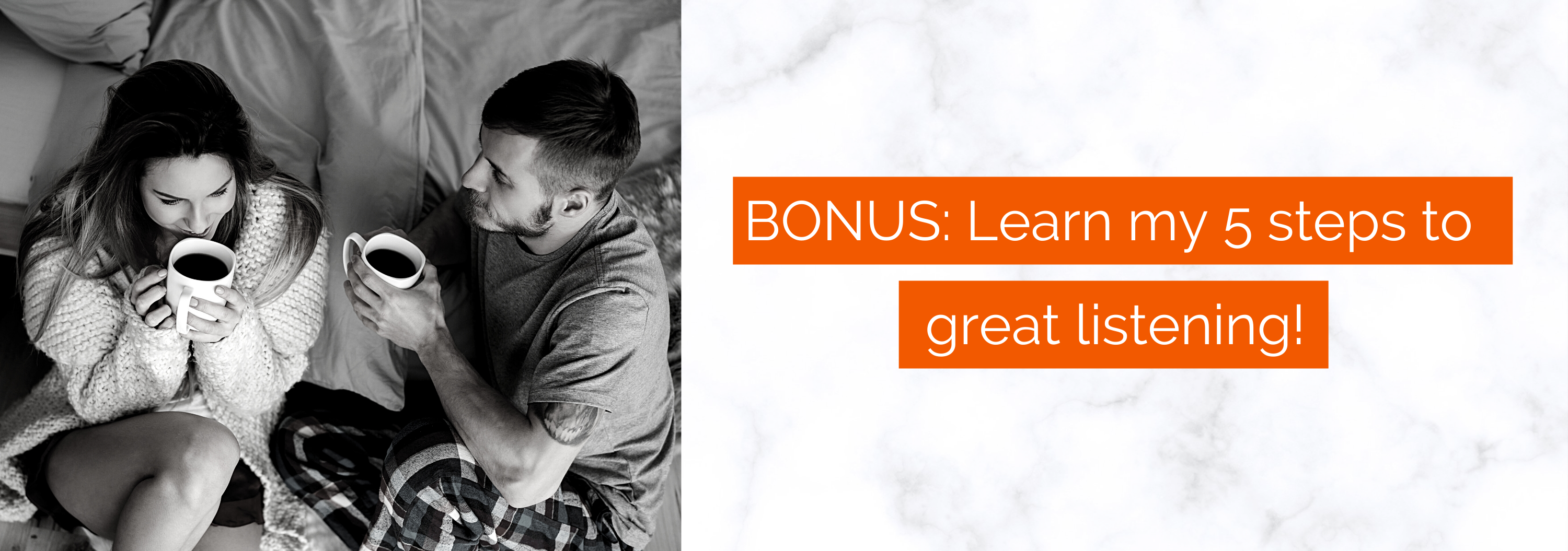
Developing empathy in relationships is the key to connection and communication! In fact, empathy is incredibly good for you! We know from the research that it not only strengthens relationships, but it also increases cooperation, helps people forgive, decreases negativity, aggression and being judgmental and even improves your physical health! Stay tuned to learn my five steps to becoming an empathy ninja so you can create deep connection, joy and ease in all your relationships.
9-minute read
Prefer to listen to the podcast? Click here!
Let me tell you about a couple I recently worked with and an exchange they had. Zane and Laura are a couple in their late 30s. Zane works full time and Laura has been working a little over part-time since the birth of their children who are now four and six.
Zane came home from work one night after a particularly grueling day. He threw his backpack and keys on the dining room table, kicked off his shoes along the way and made his way to the den to turn on the game (his favorite team was playing and he’d been listening to them lose in the car ride home).
Laura had also worked a good portion of the day and had dropped off and picked up the kids from daycare and school, grocery shopped and was now trying to cook dinner while watching them. She was so relieved when she’d heard the garage door open 15 minutes earlier and knew that Zane was finally home, but she hadn’t seen him yet. While going in search of him she tripped over the shoes he’d kicked off and found his backpack and a bunch of papers on the floor nearby.
Exhausted and annoyed, she found him in the den watching football.
She said to him, “I just tripped over your shoes. I’ve asked you 100 times not to leave them in the middle of the floor! I need you to take care of the girls while I finish making dinner. And please pick up your backpack and papers – you’ve been here ten minutes and you’ve already made a mess.”
Zane responded, “I had a crappy day at work and I just need a few minutes to unwind. Could you not yell at me the second I come in the door?”
To which Laura said, “I wish I could unwind too – I’ve been running at full tilt all day and would love a few minutes to myself too. But we’ve got hungry kids who need to get fed and get their baths or they’ll never get to bed on time! I’m so sick of you thinking that you’re the only one who needs downtime. I’m busier than you are!”
To which Zane replied, “Calm down, you’re getting all worked up. It’s OK if the girls go to bed 10 minutes late.”
I could keep going but you know how this turned out because you’ve likely had a very similar interaction in your own home (or can at least imagine this one). The rest of the evening was full of tension and anger as Zane and Laura each thought they were right and that their partner was being an asshole.
Zane and Laura came to me to work on their communication skills, but this is a surface-level problem, not the real issue eating at their relationship. What’s really missing is the understanding that a couple is a team and feeling empathy and good will for your partner. I’ve talked about not keeping score and working as a team previously, so today we’re going to work on how to develop empathy in relationships. Without that, you can have all the great communication tools in the world, but they won’t work consistently.
And just saying that you can feel your partner’s frustration or pain isn’t enough to truly be empathetic. If Zane had really felt Laura’s frustration, he would have gotten up and taken care of the girls. If Laura had truly felt Zane’s overwhelm, she might have given him 15 minutes to unwind before coming to help.
Feeling truly understood and seen by our partners (or anyone) is one of our deepest needs as humans. Psychologist Carl Rogers, the father of the client-centered approach to therapy, talked incessantly about the need for empathy in human relationships. He said, “When someone really hears you without passing judgment on you, without trying to take responsibility for you, without trying to mold you, it feels damn good!” He goes on to say, “When a person realizes he has been deeply heard, his eyes moisten. I think in some real sense he is weeping for joy. It is as though he were saying, “Thank God, somebody heard me. Someone knows what it’s like to be me.”
NOTE: This is true for all relationships, not just partnerships!
Three Kinds of Empathy in Relationships
Psychologists Daniel Goleman and Paul Ekman break empathy down into three categories and while all three are wonderful, one of them doesn’t create the kind of deep connection most people are wanting.
1. Cognitive empathy
This is when you’re able to understand how another person feels and what they might be thinking.
2. Emotional empathy
This is when you’re actually able to feel what someone else is feeling and this is where a deeper emotional connection starts.
3. Compassionate empathy
Now that you understand what someone’s feeling and can experience that feeling yourself, you’re moved to take action and help however you can.
The Five Steps to Developing More Empathy in Relationships
Step 1: Listen Hard and Ask Thoughtful Questions
To develop empathy, you first have to learn to really listen. I mean listen hard, like this is your job and you’re getting paid. Listening means you’re completely present for what’s being said. You’re not reacting from your own thoughts or feelings but are being mindful so you can stay in the present moment and be fully engaged in what the other person is saying.
In your listening, your goal is to identify what the other person is feeling, which means you need to recognize what different feelings look, sound and feel like in your partner or this other person. Don’t assume! You might need to ask some gentle questions to be sure of what’s going on. These are not questions meant to problem-solve, these are questions meant to explore and deepen connection.
Here are some examples of good open-ended questions:
- Can you tell me more about X?
- What’s the most upsetting/sad part of X?
- How have you been feeling about X?
- What else have you been feeling about X?
- What’s bothering you the most about X?
- What do you mean when you say X?
- What is this reminding you of?
Bottom line: Listen for the emotion, not the content!
Step 2: Connect with the Feeling, Not the Situation
What usually happens is that someone is sharing something that upset them, but it’s not something that would upset you, so it’s hard to find the compassion, patience or empathy for what they’re experiencing. That’s because you’re focusing on the wrong thing.
Instead of focusing on the situation and putting yourself in that situation, focus on the feeling and think of a time you’ve had that feeling.
From Step 1, you might have identified that your partner is feeling humiliated and upset that they messed up a presentation at work. You don’t have a job where you make presentations and you find speaking in front of people easy anyway, so you might feel like you can’t empathize even though you’ve identified the feelings they’re having.
Instead of trying to put yourself in that situation, think of a time you felt humiliated or upset. Ask yourself, “When have I felt something like what they’re describing?” Recall that painful feeling, not a similar event. Now you can empathize.
Bottom Line: It’s not about how you would feel in a similar situation. It’s about being in their emotional shoes and feeling what they felt in that situation. You’re taking on this painful emotion so that your partner or the other person doesn’t have to go through this alone.
Step 3: Share Your Own Feelings
Step 3 is all about sharing your own experiences with this feeling. Again, the key isn’t to problem-solve or attempt to figure anything out. The key is to let the other person know they’re not alone in these types of feelings. So, in the example above, you might say something like, “I remember my dad yelling at me when I struck out in a ball game in high school. He was screaming from the stands in front of all my teammates, my coach and all the other parents. I walked off the field so humiliated. I couldn’t make eye contact with anyone and when they told me it was OK and to ignore him, it just made me feel worse. I couldn’t imagine ever walking back out on a field after that.”
It’s very important that you stop right there though! Do NOT go on to say, “But I did and it was OK. I got over it and moved on and you can too!”
We do things like this because we hate seeing our partners or those we love in pain, so we try to move it all along and cheerlead or problem-solve, so that we can be more comfortable, but that’s not empathy and it doesn’t help the person feel better. If you can just stay right there, feeling that long-ago feeling you had of that same type of humiliation and despair, your partner will absolutely not only feel comforted but will feel closer to you too.
Step 4: What Can I Do?
It is ONLY after you’ve completed the other steps that you can then ask more questions to show support and teamwork. When you’re empathetic with your partner you become a teammate with them against whatever the hardship or bad event is!
Now you can ask:
- Is there anything I can do for you?
- If I could say the perfect thing right now, what would it be?
- If I could do one wonderful thing to support you right now, what would it be?
- Is there anything you need from me right now?
Step 5: Practice Makes Perfect
Empathy in relationshps is a skill. The more you practice the better you get. So, the last step in developing empathy in relationships is to consistently listen to one another’s thoughts and feelings. It’s to stay curious about the innerworkings of your partner. As you learn to see the world from your partner’s point of view, you deepen your understanding and connection.
A great practice is to also take a relationship quiz where you answer questions about your partner and then compare answers at the end to see how well you know this person. It’s a wonderful way to deepen understanding and this idea of really being seen by your partner.
Because I love you so much, you can download the free relationship quiz and try it out today!
And here are my five steps to great listening to keep working on building empathy in relationships!









